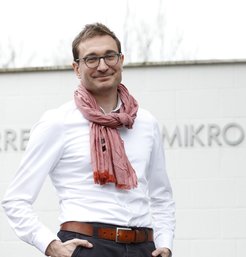Dr. Tobias Erb appointed to new director of the Department of Synthetic Biochemistry at the Max Planck Institute for Terrestrial Microbiology in Marburg
The greenhouse gas carbon dioxide is the focus of the research of Dr. Tobias Erb. His research group studies carbon dioxide-converting microorganisms and their influence on the global carbon cycle and the atmosphere. Tobias Erb is particularly interested in the metabolic pathways and biocatalysts of bacteria that capture and convert carbon dioxide. Together with his team, Dr Erb uses this understanding to design and create new pathways for the efficient conversion of carbon dioxide in the laboratory.
The conversion of atmospheric carbon dioxide is the basis for our food chain, our energy supply and our modern chemical industry. Photosynthesis is the best-known carbon dioxide converting process. “In our laboratory, we aim at discovering novel, thus far unknown, mechanisms for carbon dioxide capture and conversion in microorganism”, explains Tobias Erb. “The goal is to understand how such new metabolic pathways evolved, how these pathways operate and how we might use them to develop carbon dioxide as sustainable carbon source of the future”.

One example is a carbon dioxide-converting enzyme from alphaproteobacteria that is studied in the research group of Tobias Erb and that is able to capture carbon dioxide up to twenty times faster than the corresponding enzyme from plants. In a groundbreaking study that was recently published in the journal Science, Tobias Erb and his team used this “turbo-enzyme” to design and realize a completely artificial pathway for the fixation of carbon dioxide in the test tube. This work drew worldwide attention as a milestone on the way towards realizing artificial photosynthesis. Tobias Erb is a pioneer in synthetic biology, a field that ultimately aims at constructing useful microorganisms and minimal cells for the benefit of humanity.
Synthetic biology is a hot topic at the Max Planck Institute in Marburg as well as in the Max Planck Society, where it is fostered through the MaxSynBio network. Tobias Erb will become a new member of the MaxSynBio network. “Through synthetic biology a completely novel research field opens for us scientists”, says Tobias Erb. “With synthetic biology we are now able to design completely novel solutions in a rational fashion”, he explains further. “I am looking forward to continuing and intensifying my research on synthetic microbiology in Marburg and within the Max Planck Society”.
Tobias Erb studied chemistry and biology and worked for his PhD at the University of Freiburg and the Ohio State University (US). After a postdoctoral stint at the University of Illinois (US), he founded his junior research group at the Swiss Federal Institute of Technology (ETH) in Zurich from 2011-2014. In 2014 Tobias Erb moved to Marburg, where he headed an independent Max Planck Research Group. Erb received multiple awards for his research including those of the Swiss, as well as the German Societies for Microbiology and an ERC Starting Grant. In 2015, he was named one of 12 up- and coming scientists by the American Chemical Society. Last year, Tobias Erb received the Heinz-Maier-Leibniz prize of the German Research Foundation (DFG).
With the appointment of Tobias Erb the longstanding tradition of research on climate relevant greenhouse gases at the Max Planck Institute in Marburg is developed into a new direction. His groundbreaking research approaches in synthetic biology complement and strengthen Marburg as a hotspot for microbiology research and its center for synthetic microbiology.
The managing director of the MPI, Lotte Sogaard-Andersen is excited about the appointment of Tobias Erb. “A microbiology institute without a strong basis in microbial biochemistry and physiology is unthinkable. With the successful recruitment of Tobias Erb we have secured this basis. At the same time we go beyond investigating existing metabolism to build novel pathways and that way bridge to the newly established branch of synthetic microbiology at the Max Planck Institute for terrestrial Microbiology. Tobias is quite simply a great catch for Marburg as well as for the Max Planck Society”.












